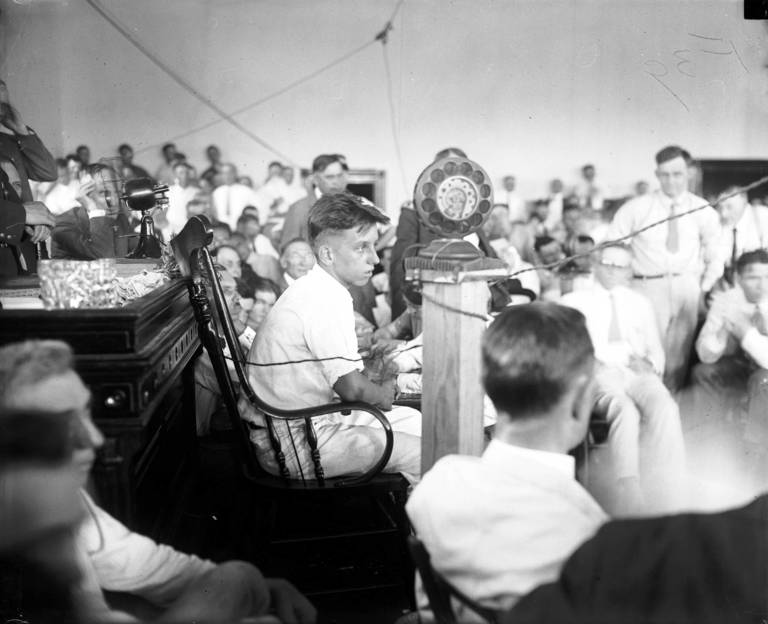Howard Morgan and Harry Shelton

Howard Morgan testifies at the Scopes trial
The entire prosecution case in the trial of John Scopes occupied less than two hours of a Wednesday afternoon session of court. The state called only four witnesses. School Superintendent Walter White and Frank Earle Robinson both testified that Scopes, in a conversation at Robinson's drug store-soda fountain-book dispensary, admitted having taught evolution. Howard Morgan, age 14, and Harry "Bud" Shelton, age 17, were the two eyewitnesses to the crime.
Like many students of John Scopes, Howard Morgan was tracked down by visiting members of the press anxious to know what effect the teaching of evolution might be having on Dayton's young people. Morgan, the son of the owner of the Dayton Bank and Trust company (and whose house Clarence Darrow occupied), eagerly offered his views on the subject. "I lapped it up," he told one reporter, "all about monkeys and things."
A few days later, Prosecutor Thomas Stewart called Morgan as his second witness. Spectators smiled as Morgan, wearing white pants and a white shirt, with a tie pulled down and to the side, took his seat in the witness chair. Stewart asked Morgan if "Professor Scopes" ever taught him "anything about evolution." "Yes sir," the boy replied in a barely audible voice. "Just state in your own words, Howard what he taught you and when it was," Stewart requested. "It was along about the second of April. He said that the earth was once a hot molten mass, too hot for plant or animal life to exist upon it. In the sea, the earth cooled off; there was a little germ of one cell organism formed, and this organism kept evolving until it got to be a pretty good-sized animal, and then it came on to be a land animal, and it kept on evolving, and from this was man." From the defense table, Arthur Garfield Hays offered his congratulations on Morgan's history of life on earth: "Go to the head of the class." Stewart asked Morgan if Scopes classified "man with reference to other animals." He had, Morgan said, he called humans "mammals."
In his cross-examination, Clarence Darrow focused his attention on the question of what it meant to be classified a mammal. "Dogs and horses, monkeys, cows, man, whales: he said all of those were mammals?" "Yes sir," Morgan answered, "but I don't know about the whales." Apart from calling man a mammal, Darrow wanted to know, "Did he tell you anything else that was wicked?" Morgan looked at his teacher and smiled. "No, not that I remember of," he finally answered. "It has not hurt you any, has it?" Darrow asked, concluding his cross-examination. "No sir," Morgan answered. As the courtroom erupted in laughter, Darrow turned to Mrs. Rappalyea, seated behind him, and said, "Would you believe this is the twentieth century?"
Harry Shelton took the stand next. Three years older than Howard, Harry studied evolution in Biology in mid-April, when Scopes substituted for an ill teacher. Shelton testified that Scopes reviewed the chapter on evolution in George Hunter's Civic Biology. He offered little elaboration other than to say "He taught all forms of life begin with a cell." Darrow questioned Shelton only briefly. He wanted to know, "You didn't leave church when he told you all forms of life begin with a single cell?" "No sir," Shelton answered. Leaving the courtroom with Morgan, Shelton was overheard asking, "Don't you think Bryan is a little narrow-minded?"
After the boys' day on the stand, a reporter interviewed mothers of the teenagers. Howard's mother told the reporter, "The teaching of evolution hasn't hurt me or my boy. I don't think any of us here in the mountains have studied evolution enough. I wish I knew more about it." Harry's mother expressed a similar view. "As far as I'm concerned," she said, "they can teach my boy evolution every day of the year." She added that the subject threatened little harm because "he had forgotten most of his lessons" and “had to get the book out and study it up" for trial.
